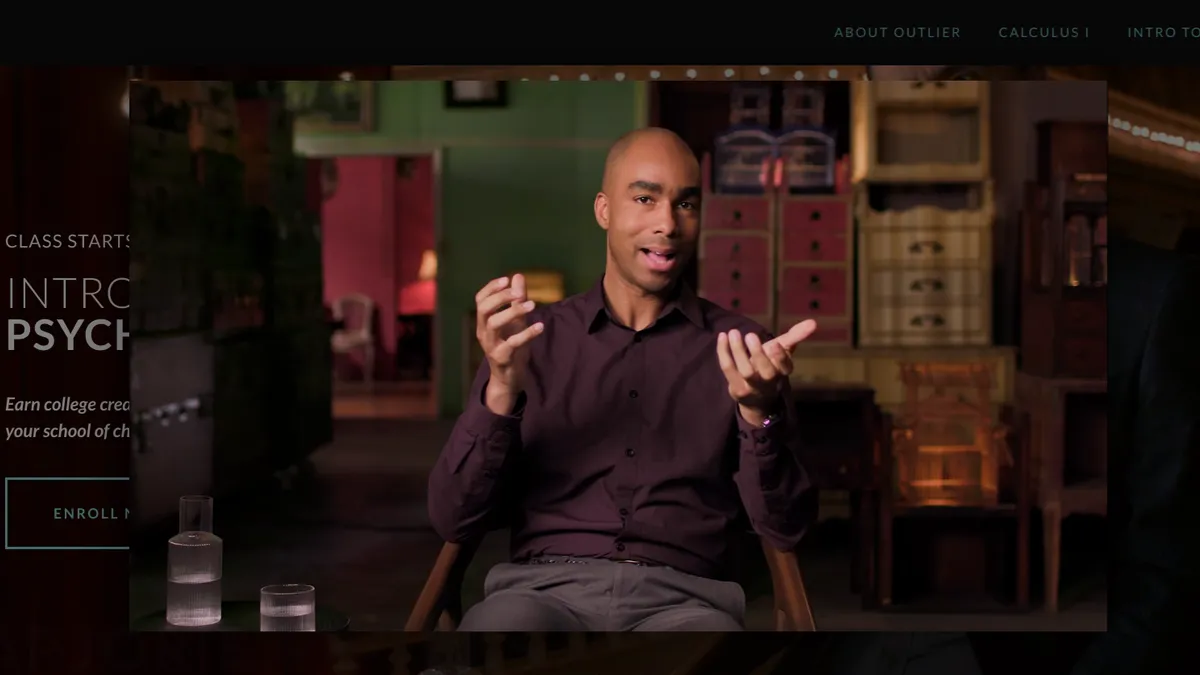Dive Brief:
- A new company from the co-founder of MasterClass — which offers expert-taught online classes in disciplines from photography to home cooking — wants to bring large introductory college courses online and scale them for several colleges and universities to use.
- Outlier.org is set to launch Sept. 9 with two, three-credit, 14-week courses: Calculus I and Introduction to Psychology. They will be offered through the University of Pittsburgh, which will facilitate the transfer of credits.
- Priced at $400 per course and targeting students who want to affordably complete general education requirements, the classes address the growing interest in reducing college costs. But questions remain as to how widely the credits will transfer.
Dive Insight:
"They're greasing the skids, they're trying to make it easy, but that's not the same thing as (saying), by definition other schools will accept it," Phil Hill, co-founder of Mindwires Consulting, told Education Dive in an interview. "There still is that step of, 'Will other schools accept these credits?' That's going to be the make-or-break."
Getting other institutions' buy-in may prove difficult given the piece of the higher ed curriculum Outlier.org is targeting. Large lecture classes with plug-and-play content and limited interactivity often subsidize smaller, in-depth courses for upperclassmen, he said. That could make larger universities resistant to the idea.
Outlier.org is not the first organization to try to bring economies of scale to general education courses.
Companies like StraighterLine and access-controlled MOOCs have sought to lower the cost of introductory classes while making it easier for students across the country to access them. However, making college classes so widely accessible does not readily translate into stronger completion rates.
Take Arizona State University's Global Freshman Academy, which allows prospective students to take college classes online and pay for them only if they wish to receive academic credit.
Three years in, less than 1% of the 373,000 enrollees had earned credit from Arizona State, EducationNext reported. And just 150 went on to enroll in the university, which participants who maintain a 2.75 GPA are qualified to do.
Outlier.org is starting small, with less than 100 students expected in each class for the fall term, its founder and CEO Aaron Rasmussen told Education Dive in an interview. "One of the problems I saw with many other online universities is they try to scale immediately, and it makes it very difficult to adapt and listen to your students," he said.
The courses combine video lectures from academics with open-access materials and a proprietary learning management system. Lecturers can work directly with students but aren't required to, Rasmussen said. Outlier.org manages interactions among the class and uses artificial intelligence proctoring through Examity for assessments.
"While Outlier.org has taken the lead in many of these areas, Pitt faculty members have closely reviewed the syllabi and assessments to ensure that they meet our high standards," said University of Pittsburgh Provost Ann Cudd in an email to Education Dive.
Rasmussen hopes partnering with the University of Pittsburgh can help Outlier.org overcome the lack of prestige commonly associated with online education, something he argues is a barrier to its wider adoption. "Partnering with a top-100 university like that makes the entire thing much easier to grasp for the student — that means it actually means something," he said. Working with the university also "increases the chances (those credits) transfer within the existing university system," he added.
Students taking the courses should review their institutions' credit-transfer policy and contact their registrar if they have questions, Cudd said.
The University of Pittsburgh called its relationship with Outlier.org "a pilot" that is focused on students beyond its institution. "We will evaluate next steps at the conclusion of the pilot," Cudd said.
Outlier.org is discussing possible partnerships with the University of Pittsburgh and other institutions for 2020 and later, according to its website.














